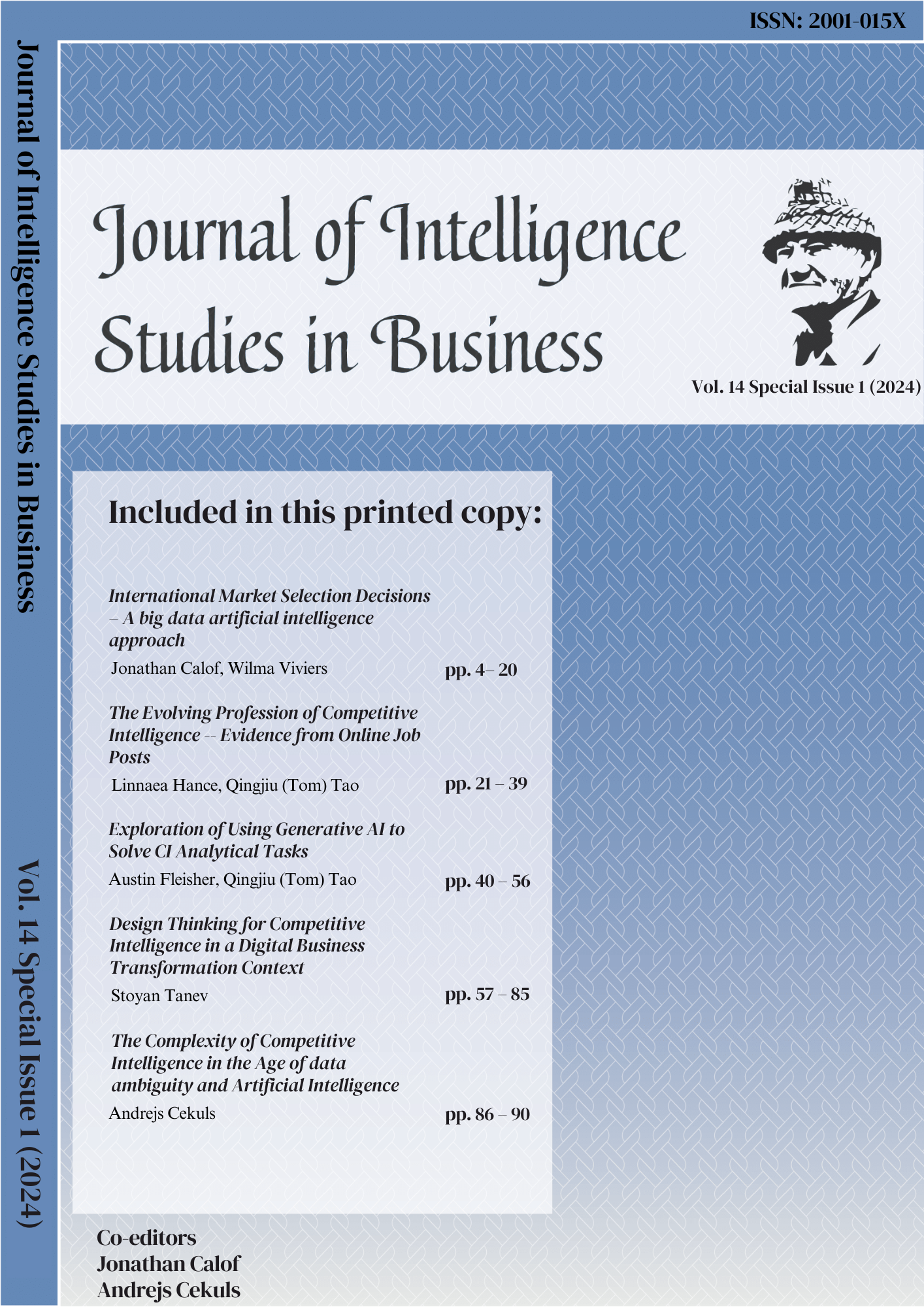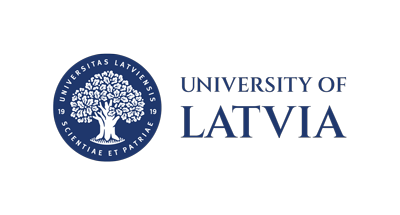The Complexity of Competitive Intelligence in the Age of data ambiguity and Artificial Intelligence
DOI:
https://doi.org/10.37380/jisib.v14.si1.2417Keywords:
competitive intelligence, AI tools, data analysis, decision makingAbstract
The aim of the study is to explore the development aspects of competitive intelligence (CI) in terms of the challenges posed by the increase in data volume, incl. unverified data, data reliability, and the integration of artificial intelligence (AI) into data analysis processes. The primary research question explores how the role of the human factor has become increasingly important in ensuring the accuracy and reliability of data used by AI, especially in an era dominated by AI and rapid information dissemination.
The study highlights the imperative role of human judgment in the era of AI-driven data analysis, highlighting skills, competencies, and authority as critical factors in evaluating data processing outcomes. This points to the risks associated with the uncritical adoption of AI-generated solutions, which can lead to innovative but impractical outcomes that consume significant organizational resources. Furthermore, the study calls for a balanced approach to integrating AI into CI processes, supporting strategies that enhance the synergy between human analytical prowess and AI computational efficiency. This approach is critical to overcoming the challenges posed by data reliability and ensuring the effective implementation of CI strategies that are both innovative and grounded in reality.
References
Abis, S., Veldkamp, L., 2024. The Changing Economics of Knowledge Production, Review of Financial Studies, 37(1), pp. 89 – 118. DOI: https://doi.org/10.1093/rfs/hhad059
Calof, J., 2020. The impact of firm size on competitive intelligence activities, Foresight, 22(5-6), pp. 563 – 577. DOI: https://doi.org/10.1108/FS-08-2020-0080
Calof, J. and Cekuls, A., 2023. SCIP Prague 2023 - Academic Track: What is the future direction of competitive intelligence, Journal of Intelligence Studies in Business, 13, Special Issue, doi: 10.37380/jisib.v13iSpecial%20Issue%201.1132
Calof, J. and Sewdass, N., 2020. On the relationship between Competitive Intelligence and Innovation, Journal of Intelligence Studies in Business, 10(2), doi:10.37380/jisib.v10i2.583. DOI: https://doi.org/10.37380/jisib.v10i2.583
Cekuls A., 2022. Expand the scope of competitive intelligence, Journal of Intelligence Studies in Business, 12(1). doi: 10.37380/jisib.v12i1.924. DOI: https://doi.org/10.37380/jisib.v12i1.924
Madureira, L., Popovič, A. and Castelli, M., 2021. Competitive intelligence: A unified view and modular definition, Technological Forecasting and Social Change, 173, p. 121086, doi:10.1016/j.techfore.2021.121086. DOI: https://doi.org/10.1016/j.techfore.2021.121086
Pansara, R. R., Vaddadi, S.A.Vallabhaneni R., Alam N., Khosla B.Y., Whig, P., 2023. Fortifying Data Integrity using Holistic Approach to Master Data Management and Cybersecurity Safeguarding, Proceedings of the 18th INDIAcom; 2024 11th International Conference on Computing for Sustainable Global Development, INDIACom 2024, pp. 1424 – 1428.
Rama Krishna S., Rathor K., Ranga J., Soni A., Srinivas D., Kumar N.A., 2023. Artificial Intelligence Integrated with Big Data Analytics for Enhanced Marketing, 6th International Conference on Inventive Computation Technologies, ICICT 2023 - Proceedings, pp. 1073 – 1077. DOI: https://doi.org/10.1109/ICICT57646.2023.10134043
Tejani, A.S., 2021. Identifying and Addressing Barriers to an Artificial Intelligence Curriculum, Journal of the American College of Radiology, 18(4), pp. 605 – 607. DOI: https://doi.org/10.1016/j.jacr.2020.10.001
Downloads
Published
Issue
Section
License
Copyright (c) 2024 Journal of Intelligence Studies in Business

This work is licensed under a Creative Commons Attribution-NonCommercial-NoDerivatives 4.0 International License.
Authors who publish with this journal agree to the following terms:
- Authors retain copyright and grant the journal right of first publication with the work simultaneously licensed under a Creative Commons Attribution License that allows others to share the work with an acknowledgement of the work's authorship and initial publication in this journal.
- Authors are able to enter into separate, additional contractual arrangements for the non-exclusive distribution of the journal's published version of the work (e.g., post it to an institutional repository or publish it in a book), with an acknowledgement of its initial publication in this journal.
- Authors are permitted and encouraged to post their work online (e.g., in institutional repositories or on their website) prior to and during the submission process, as it can lead to productive exchanges, as well as earlier and greater citation of published work (See The Effect of Open Access).








